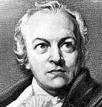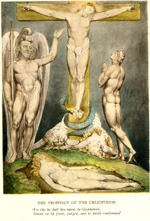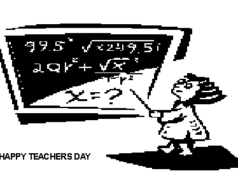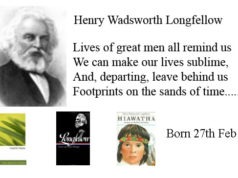WILLIAM BLAKE
(Born – November 28, 1757-August 12, 1827)
He who binds to himself a joy
does the winged life destroy;
But he who kisses the joy as it flies
lives in eternity’s sunrise.
“Bring me my Bow of burning gold:
Bring me my Arrows of desire:
Bring me my Spear: O clouds unfold!
Bring me my Chariot of Fire.”
(from ‘Jerusalem’ in Milton, 1804-1808)
Born in London, William Blake was an English Author who lived most of his life with powerful Imagination. He stayed in a cottage at Felpham, near the seaside town of Bognor, in Sussex. A Brilliant but unconventional English Poet, engraver and painter. His symbolic pictures and visionary poems are not always easy to understand because he invented his own mythology to express his ideas. But his pictures and poems reveal a powerful artistic imagination.
He attended Henry Pars’ Drawing school in 1767. He experienced visions of angels and ghostly monks and he saw he conversed with Angel Gabriel, Virgin Mary and various historical figures. At the age of 14, he was apprenticed for seven years to an Engraver James Basire. Gothic art and architecture influenced him greatly. However, as a book illustrator and engraver, he was also interested in his ‘illuminated printing‘, a process of engraving poems and related pictures on metal plates and then hand colouring the prints made from them. Except for Poetical sketches, all the Blake’s published poetry appeared in unique form. In 1783, he married Catherine Boucher, the daughter of a market gardener. He taught her to draw and paint and she assisted him.
In 1783, Blake’s first book of poems, Poetical Sketches appeared, followed by Songs of Innocence (1789), and Songs of Experience (1794). His most famous work ‘The Tyger’ was a part of Songs of Experience. In this work, the world is seen from a child’s point of view but also functions as a parable of adult experience. In ‘The Lamb’ and The Tiger’, Blake shows opposite sides of human nature, what he calls ‘the two contrary states of the human soul’. His ‘prophetic’ works include The French Revolution (1791), America (1793), The Marriage of Heaven and Hell (about 1793), Milton (about 1810) and Jerusalem (about 1820).
Blake was economically poor and Died on 12 August in his room at 3 Fountain Court.
A Song by William Blake Sweet dreams, form a shade Sweet Sleep, with soft down Sweet smiles, in the night Sweet moans, dovelike sighs, Sleep, sleep, happy child! Sweet babe, in thy face Wept for me, for thee, for all, Smiles on thee, on me, on all, |
Laughing Song by William Blake When the green woods laugh with the voice of joy, When the meadows laugh with lively green, When the painted birds laugh in the shade, |
A Dream by William Blake Once a dream did weave a shade Troubled, wildered, and forlorn, ‘Oh my children! do they cry, Pitying, I dropped a tear: ‘I am set to light the ground, More Poems on Poem Hunter |
{jathumbnail off}









